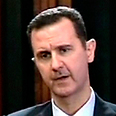
Report: Assad scattering chemical weapons to 50 sites
American officials say US, Israeli intelligence agencies still believe they know where most of Assad regime's chemical weapons are located, but with less confidence
A secretive Syrian military unit at the center of the Assad regime's chemical weapons program has been moving stocks of poison gases and munitions to as many as 50 sites to make them harder for the US to track, The Wall Street Journal reported Friday, citing American and Middle Eastern officials.
The American newspaper quoted officials as saying the movements of chemical weapons by Syria's elite Unit 450 could complicate any US bombing campaign in Syria over its alleged chemical attacks,. It also raises questions about implementation of a Russian proposal that calls for the regime to surrender control of its stockpile, they said.
Related stories:
- Op-ed: Murder will only continue
- Syrians in Israeli hospital urge US strike
- Assad: Israel should be first to disarm
US and Israeli intelligence agencies still believe they know where most of the Syrian regime's chemical weapons are located, but with less confidence than six months ago, US officials said.
The US claims a chemical weapons attack by the Syrian government on Aug. 21 killed more than 1,400 people, including at least 400 children, in rebel strongholds on the outskirts of the capital Damascus. Syrian President Bashar Assad on Thursday again denied any involvement in a chemical attack, but said his government was prepared to sign an agreement banning the use of chemical weapons.
The Wall Street Journal reported Unit 450—a branch of the Syrian Scientific Studies and Research Center that manages the regime's overall chemicals weapons program—has been moving the stocks around for months, officials and lawmakers briefed on the intelligence said.
Movements occurred as recently as last week, the officials said, after Obama said he was preparing to launch strikes.
The unit is in charge of mixing and deploying chemical munitions, and it provides security at chemical sites, according to US and European intelligence agencies. It is composed of officers from Assad's Alawite sect. One diplomat briefed on the unit said it was Alawite from "janitor to commander."
According to the report, US military officials have looked into the possibility of gaining influence over members of Unit 450 through inducements or threats. "In a perfect world, you would actually like to co-opt that unit. Who cares who pays them as long as they sit on the chemical weapons," a senior US military official was quoted by The Wall Street Journal as saying.
Although the option remains on the table, government experts say the unit is so close knit that they doubt any member could break ranks without being exposed and killed, the report said.
The US estimates the regime has 1,000 metric tons of chemical and biological agents. "That is what we know about. There might be more," one senior US official told The Wall Street Journal.
Video courtesy of jn1.tv
The regime traditionally kept most of its chemical and biological weapons at a few large sites in western Syria, US officials said. But beginning about a year ago, the Syrians started dispersing the arsenal to nearly two dozen major sites.
Unit 450 also started using dozens of smaller sites. The US now believes Assad's chemical arsenal has been scattered to as many as 50 locations in the west, north and south, as well as new sites in the east, officials said.
The Wall Street Journal said the US is using satellites to track vehicles employed by Unit 450 to disperse the chemical-weapons stocks. But the imagery doesn't always show what is being put on the trucks. "We know a lot less than we did six months ago about where the chemical weapons are," one official said.
The movements, activities and base locations of Unit 450 are so sensitive that the US won't share information with even trusted allies in the opposition for fear the unit would be overrun by rebels, current and former US officials told WSJ.
The US wants any military strikes in Syria to send a message to the heads of Unit 450 that there is a steep price for following orders to use chemical weapons, US officials said.
At the same time, the US doesn't want any strike to destabilize the unit so much that it loses control of its chemical weapons, giving rebels a chance to seize the arsenal.
"Attacking Unit 450, assuming we have any idea where they actually are, would be a pretty tricky affair because…if you attack them you may reduce the security of their weapons, which is something we certainly don't want," Jeffrey White, a veteran of the Defense Intelligence Agency and a defense fellow at The Washington Institute, told WSJ.
The Pentagon has prepared multiple target lists for possible strikes, some of which include commanders of Unit 450, according to the report.
However, a senior US official told WSJ that no decision has been made to target them.
In some respects, officials said, the hands-on role that Unit 450 plays in safeguarding the regime's chemical weapons secrets makes it too valuable for the US to eliminate, even though the US believes the unit is directly responsible for the alleged chemical weapons abuses.
Officials said the US doesn't plan to bomb chemical weapons sites directly because of concerns any attack would disperse poison agents and put civilians at risk, WSJ reported.
In addition to satellites, the US also relies on Israeli spies for on-the-ground intelligence about the unit, US and Israeli officials told the newspaper.
Though small in size, Unit 450 controls a vast infrastructure that makes it easier for the US and Israel to track its movements, according to the report.
Whenever chemical munitions are deployed in the field, Unit 450 has to pre-deploy heavy equipment to chemical mixing areas, which the US and Israel can track.
- Receive Ynetnews updates directly to your desktop











